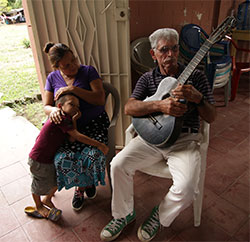‘Genesis of Exodus’ focuses on Central America travails
August 15, 2017
Why would a family leave home in Central America and embark on a harrowing 2,500-mile journey with the uncertain outcome of finding asylum in the United States? The Genesis of Exodus, a new interactive online resource, seeks answers to this question. It offers a wealth of background and tools to help Presbyterians and others understand and respond to immigration issues.
Subtitled Violence, Poverty, and Social Disintegration: The Root Causes of Central American Migration, the resource is the result of a two-week information-gathering trip — with stops in El Salvador, Guatemala and southern Mexico — by staff of the Presbyterian Church (U.S.A.)’s Office of the General Assembly (OGA) and World Mission last November.
“We went to Central America with the main goal of producing a film,” said Vicente Guna Serrano, manager of technologies for OGA. What emerged from the experience, however, was a much bigger project. Guna described the resulting resource as a “story map,” which he said is “a more interactive way to tell a story.”
The story map platform incorporates text, maps, charts, photos and multimedia, and allows users to reference other sources through links. It includes access to the trailer for the film, also titled The Genesis of Exodus.
The online resource introduces users to the history and economic background of Central America, to people who are fleeing violence in the region, and to community and religious leaders who are trying to help them. It offers glimpses of the long journey across Mexico and looks at what happens to migrants at the U.S. border and beyond. Also included is a section on “What You Can Do,” which will be expanded as more tools for action become available.
Teresa Waggener, manager of OGA’s Immigration (Legal Resources) office, wrote and compiled much of the content for The Genesis of Exodus. She said the idea for such a resource began to take shape in 2014, when families and unaccompanied children from Central America began crossing the U.S. border in unprecedented numbers.
In response, the U.S. government began “creating a massive detention system,” Waggener said. Before 2014, there were only 85 beds for women and children detained while seeking asylum. Today there are 3,600.
Detaining undocumented asylum-seekers who are fleeing life-threatening situations ignores the root causes of immigration and goes against international agreements on the treatment of refugees, Waggener said. “We’re not supposed to punish people who are arriving without status if they are seeking safety.”
The Genesis of Exodus “counters the narrative that people arriving at the border are primarily economic migrants,” Waggener said. In Central America, she and other PC(USA) staff interviewed Presbyterian mission workers, local religious leaders, community service providers, families of migrants, people who had sought asylum but been deported, and people staying in migrant shelters on their way to the United States.

A deportee waits for assistance after being processed in a Guatemalan military facility. (Photo by Vicente Guna Serrano)
“We wanted to find out why people were leaving,” Waggener explained. They found that economic insecurity, exacerbated by a history of social inequality and corruption, had created a breeding ground for violence in the region.
The violence became especially real when the Presbyterian group visited El Salvador, where they learned that a family they were scheduled to interview had been murdered the night before.
“We were given minimum information” about the incident because of security concerns, Guna recalled. But while working on the story map, he felt this family’s story was a “missing piece.”
Waggener hopes The Genesis of Exodus will raise awareness about immigration issues and motivate more Presbyterians to get involved in advocacy and ministry with refugees. She hopes that groups already active in such efforts will use the resource to increase their involvement.
The Bible is full of stories about refugees — including Jesus and Moses, Waggener said. “This is the story of our faith ancestors. And there’s a history in our church of stepping up for asylum-seekers.”
In the 1980s, for example, Presbyterians were at the forefront of movements to assist Haitian refugees (“boat people”) and provide “sanctuary” for refugees from Central America.
“It’s a part of our history,” Waggener said. “It’s who we are. It’s what we do.”
Eva Stimson, Office of the General Assembly Communications
Today’s Focus: Genesis of Exodus – interactive online resource
Let us join in prayer for:
PC(USA) Agencies’ Staff
Michael Gehrling, PMA
Kim Long, PMA
Let us pray:
Gracious God, you are right beside us. Help us to see the opportunities we have to be present with others and to be grateful for those who are present with us. Amen.
Daily Readings
Morning Psalms 42; 146
First Reading 2 Samuel 14:1-20
Second Reading Acts 21:1-14
Gospel Reading Mark 10:1-16
Evening Psalms 102; 133
![]() You may freely reuse and distribute this article in its entirety for non-commercial purposes in any medium. Please include author attribution, photography credits, and a link to the original article. This work is licensed under a Creative Commons Attribution-NonCommercial-NoDeratives 4.0 International License.
You may freely reuse and distribute this article in its entirety for non-commercial purposes in any medium. Please include author attribution, photography credits, and a link to the original article. This work is licensed under a Creative Commons Attribution-NonCommercial-NoDeratives 4.0 International License.
Categories: Mission Yearbook
Tags: central america, genesis of exodus, immigration issues, mission yearbook, story map


